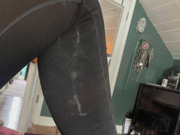Pet attacks are rising, and councils are drawing the line—here’s what they want done about it
By
Maan
- Replies 2
Australians love their pets—but when rules aren’t followed, the consequences can be serious.
Some councils say they’ve had enough, and they’re now pushing for major changes to how pet ownership is regulated.
Their proposals could have far-reaching implications for owners across the state.
Major councils in New South Wales have sounded the alarm over a worrying rise in dog attacks and irresponsible pet ownership, calling on the state government to crack down with tougher penalties and greater enforcement powers.
Over the past two decades, NSW recorded a significant surge in dog attacks—jumping from 900 in 2004 to a staggering 5,000 in just the past year. But physical attacks weren’t the only issue flagged by local authorities.
Randwick City Council, based in Sydney’s eastern suburbs, reported an increase in problematic behaviour from pet owners, including a decline in basic responsibilities like cleaning up after their dogs and properly supervising them in off-leash areas—especially when children and wildlife were nearby.
As part of the ongoing review of the Companion Animals Act 1998, Randwick formally urged the NSW government to consider stricter fines, harsher penalties, and expanded powers for councils to take action against dangerous or nuisance animals. The call was put forward during a council meeting held in late May.
‘Randwick City Council is calling for tougher pet laws, stronger enforcement powers and better education,’ the council stated.
Neighbouring Waverley Council, which includes Bondi, also backed the push. It reportedly recommended that rule-breaking pet owners be required to attend training courses.
‘We encourage responsible pet ownership to ensure safety and that everyone, including our four-legged companions, can enjoy our parks and community,’ Waverley Council stated.
The proposal extended beyond dogs. Randwick’s submission also suggested that mandatory cat containment laws be introduced—something many conservationists have long supported due to the damage cats inflict on local wildlife. Even well-fed domestic cats can be prolific hunters, killing birds, reptiles and small mammals.
Despite councils being responsible for enforcing pet-related fines, they don’t have the authority to set them. Those amounts are established by state legislation. Currently, dog owners can be fined $330 for walking their pet off-leash in prohibited areas, and $275 for failing to pick up after them.
But Randwick’s Mayor Dylan Parker said the penalties in place didn’t reflect the severity of some incidents.
‘The law currently states that a dog that attacks another dog attracts the same fine as when it attacks a child. Clearly, that’s not right,’ he said.
‘Everyone loves their dog until something goes wrong, and that’s why we want to make sure we get the rules right for the 21st century.’
The campaign for tighter controls comes at a time when the pet population has exploded. Following the Covid-19 pandemic and a surge in remote work, the number of households with pets jumped from 61 per cent to 69 per cent. In NSW alone, there are now an estimated 4.7 million cats and dogs—making responsible pet ownership a critical issue for public spaces, ecosystems and community safety.
Randwick and Waverley councils have been contacted for further comment.
Related stories that highlight growing tensions over pet behaviour include one resident’s five-year legal battle with a local council over their dogs, new laws surrounding pets in graveyards, and troubling reports of roaming dogs terrorising inner-city neighbourhoods.
The push from councils now places pressure on the NSW government to act—or risk letting an increasingly widespread issue continue unchecked.
It’s one thing to read about the risks…it’s another to see how dangerous it’s become for everyday workers.
Watch what some Aussies are up against just doing their jobs.
Source: Youtube/9 News Australia

With pet numbers on the rise and public spaces under pressure, do you think today’s owners are as responsible as they used to be? Let us know your thoughts in the comments.
Some councils say they’ve had enough, and they’re now pushing for major changes to how pet ownership is regulated.
Their proposals could have far-reaching implications for owners across the state.
Major councils in New South Wales have sounded the alarm over a worrying rise in dog attacks and irresponsible pet ownership, calling on the state government to crack down with tougher penalties and greater enforcement powers.
Over the past two decades, NSW recorded a significant surge in dog attacks—jumping from 900 in 2004 to a staggering 5,000 in just the past year. But physical attacks weren’t the only issue flagged by local authorities.
Randwick City Council, based in Sydney’s eastern suburbs, reported an increase in problematic behaviour from pet owners, including a decline in basic responsibilities like cleaning up after their dogs and properly supervising them in off-leash areas—especially when children and wildlife were nearby.
As part of the ongoing review of the Companion Animals Act 1998, Randwick formally urged the NSW government to consider stricter fines, harsher penalties, and expanded powers for councils to take action against dangerous or nuisance animals. The call was put forward during a council meeting held in late May.
‘Randwick City Council is calling for tougher pet laws, stronger enforcement powers and better education,’ the council stated.
Neighbouring Waverley Council, which includes Bondi, also backed the push. It reportedly recommended that rule-breaking pet owners be required to attend training courses.
‘We encourage responsible pet ownership to ensure safety and that everyone, including our four-legged companions, can enjoy our parks and community,’ Waverley Council stated.
The proposal extended beyond dogs. Randwick’s submission also suggested that mandatory cat containment laws be introduced—something many conservationists have long supported due to the damage cats inflict on local wildlife. Even well-fed domestic cats can be prolific hunters, killing birds, reptiles and small mammals.
Despite councils being responsible for enforcing pet-related fines, they don’t have the authority to set them. Those amounts are established by state legislation. Currently, dog owners can be fined $330 for walking their pet off-leash in prohibited areas, and $275 for failing to pick up after them.
But Randwick’s Mayor Dylan Parker said the penalties in place didn’t reflect the severity of some incidents.
‘The law currently states that a dog that attacks another dog attracts the same fine as when it attacks a child. Clearly, that’s not right,’ he said.
‘Everyone loves their dog until something goes wrong, and that’s why we want to make sure we get the rules right for the 21st century.’
The campaign for tighter controls comes at a time when the pet population has exploded. Following the Covid-19 pandemic and a surge in remote work, the number of households with pets jumped from 61 per cent to 69 per cent. In NSW alone, there are now an estimated 4.7 million cats and dogs—making responsible pet ownership a critical issue for public spaces, ecosystems and community safety.
Randwick and Waverley councils have been contacted for further comment.
Related stories that highlight growing tensions over pet behaviour include one resident’s five-year legal battle with a local council over their dogs, new laws surrounding pets in graveyards, and troubling reports of roaming dogs terrorising inner-city neighbourhoods.
The push from councils now places pressure on the NSW government to act—or risk letting an increasingly widespread issue continue unchecked.
It’s one thing to read about the risks…it’s another to see how dangerous it’s become for everyday workers.
Watch what some Aussies are up against just doing their jobs.
Source: Youtube/9 News Australia
Key Takeaways
- NSW councils called for stricter pet laws following a sharp rise in dog attacks.
- Randwick and Waverley councils urged stronger penalties, enforcement powers, and public education.
- Proposals included mandatory cat containment and rule-breaker training courses.
- The growing pet population post-pandemic raised concerns about safety and environmental impact.
With pet numbers on the rise and public spaces under pressure, do you think today’s owners are as responsible as they used to be? Let us know your thoughts in the comments.








